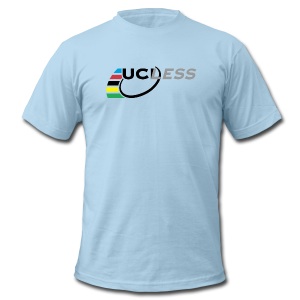“We are no longer convinced that the international professional world of cycling can make this a clean and fair sport. We are not confident that this will change for the better in the foreseeable future.”
Rabobank, on their departure as a professional cycling sponsor

That about sums it up.
As someone who has advocated, and continues to advocate, that cycling is getting better when it comes to drugs, it’s slightly painful to agree with that statement. Maybe this is how Fatty felt when he finally faced the music. Regardless, I can’t find any fault with Rabobank’s assessment—and I’m the sort who believes there’s no such thing as bad press.
Since my last post, I’ve been trying to come up with something else to say. Something that wasn’t furious, or venting, or profanity-laced; something constructive, beyond retreading the obvious and occasionally malevolent ineptitude at the top of the sport, and the deception and chaos this has wrought below. And I think Rabobank beat me to it.
The only way cycling can begin to restore credibility is through more sponsors following Rabobank’s lead.
I don’t mean sponsors should simply bail from cycling. Quite the opposite, really—Rabobank’s exit was a tactical masterpiece. Cessations of cycling sponsorships have historically been messy, catastrophic affairs—a phony check, a sea of rumors, riders high and dry. Rabobank’s staged withdrawl, which continues to pay existing contracts without brand representation, is the antithesis of these historical collapses.
More tellingly, Rabobank is continuing to remain connected to its cycling initiatives unencumbered by the UCI—amateur squads, development, and youth programs. The sound bite at the heart of its press release even targets the UCI in the most-certain terms possible (“international professional world of cycling”) without risking any undue attention from Aigle’s notoriously busy legal team. The message here is clearly “Pro-cycling, anti-UCI”.
While painful and heavy-handed, this approach leverages the rest of the world’s only representation in Aigle’s kangaroo court: money. By writ, the UCI is beholden only to the IOC, but as they’ve shown in their dust-ups with teams over radios and the Tour of Beijing, and with the Grand Tours over TV rights, their pocketbook can be a useful pain point.

If I were a major sponsor, or even a man with access to funding and an inclination to support the sport—not to name names, but someone along the lines of @dbrogan or @holowesko—I might go so far as to place some very public hunks of cash into a trust fund, to be invested in a UCI team upon the resignation or removal of Pat McQuaid and Hein Verbruggen from the governing body.
Because, frankly, it is impossible to believe there will be any change while the current regime in Aigle is in charge. McQuaid’s recent sentiments declare whistleblowers to be “scumbags”, and have effectively said that if we can’t detect doping, then it’s OK not to catch dopers. It’s the same blind-eyed (how many positives would a 53% HCT limit really return?), kill-the-messenger (study the UCI reaction to Jesus Manzano in 2005) approach that’s worked the sport into this ugly little quagmire.
It won’t take long for there to be an impact—another two or three sponsors or potential sponsors, of the big, multi-national sort that the ProTour was invented to attract—will make it clear that professional cycling cannot be financially tenable until the UCI cleans house. But until sponsors start voting with their checkbooks, the UCI can continue to insist that they, as guardians of this sport, have nothing to atone for.
Word!!! And USA cycling isn’t much better. Not as enabling as UCI, but clearly they too turned a blind eye and it’s been the Jim Ochowicz club for way, way, way too long.
The UCi, Ligget – all of them need to go. Riders need to come clean, and by clean, I mean clean – no more of this “I’ve been clean since 2006” – puhlease.
Personally, I’m not sure what to do – love the sport, but there is sooo much dirt, so much politics – it just sucks!!!!